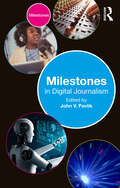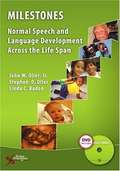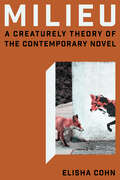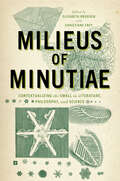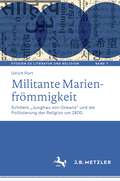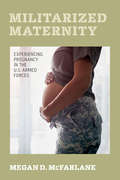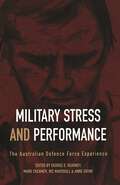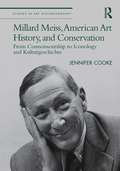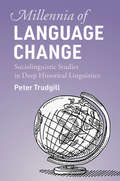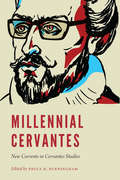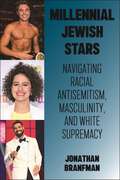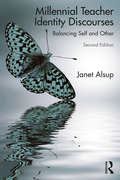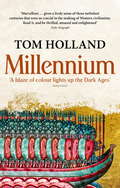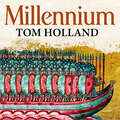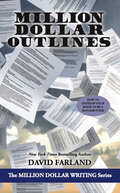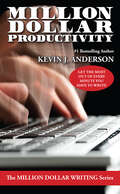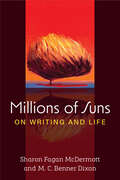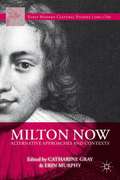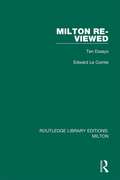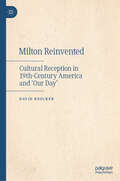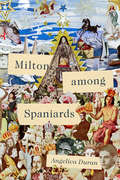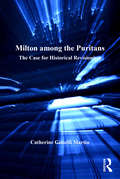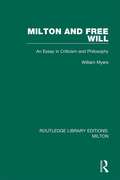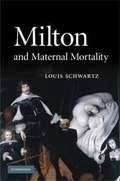- Table View
- List View
Milestones in Digital Journalism (Milestones)
by John V. PavlikMilestones in Digital Journalism sets out ten defining moments that changed the way we understand, produce, finance and engage with the news today.Designed for weekly use on digital journalism courses, these ten milestones provide a conceptual roadmap to understanding the subject while drawing on case study examples which help students home in on key markers in its history. Each milestone is selected for its impact on the nature of journalism practice, the content of journalism, the structure of the journalism industry and/or public engagement in the news. Milestones are defined as the key markers in the development of digital journalism worldwide since the 1970s. The featured markers are diverse and global, ranging from the first virtual reality (VR) screening of Nonny de la Peña’s Hunger in Los Angeles at Sundance Film Festival, to citizen reporting of the police killing of George Floyd in 2020. Written by experts in each of the areas chosen, this book offers an inclusive and de-centred overview of the field and an ideal springboard for further study.Milestones are a range of accessible textbooks, breaking down the need-to-know moments in the social, cultural, political and artistic development of foundational subject areas.This book is key reading for students learning about the history of digital journalism worldwide.
Milestones: Normal Speech and Language Development Across the Life Span
by John W. Oller Stephen D. Oller Linda C. BadonThis book provides an introduction to cutting-edge theory and research dealing not only with the development of speech forms but with the full range of sign systems that undergird normal speech and language development across the whole life span.
Milieu: A Creaturely Theory of the Contemporary Novel
by Elisha Jane CohnIn this creaturely theory of the novel, Elisha Cohn rethinks the status of animals in recent global fiction, arguing that literary representation of animals should matter to any reader invested in the novel as a form, and showing how literary style makes knowable our imperiled multispecies worlds. Cohn argues that the animal lives of contemporary fiction move beyond allegories of globalization's fracture of subjectivity by emphasizing the creaturely dimensions of narrative. This shift in focus registers through recent fiction's fascination with milieus: environments made perceptible through sentience that humans share with other creatures. Showing how theories of milieu—from Jacob von Uexküll, George Canguilhem, and Sylvia Wynter to recent studies in comparative cognition—converge with and are conceptually indebted to Indigenous and Black ontologies, Cohn argues that the milieu not only explains the centrality of animals to contemporary fiction, but also promotes dialogue across disciplines invested in anti-hierarchic accounts of embodied life. Each chapter foregrounds formal resonances in texts from the mid-1990s through the present, including work by Téa Obreht, Yoko Tawada, NoViolet Bulawayo, Sigrid Nunez, Jesmyn Ward, Linda Hogan, Lucy Ellmann, Amitav Ghosh, and Aminatta Forna. Throughout, Cohn compellingly argues for the centrality of narrative voice in avoiding, deferring, or complicating modes of figuration and critical interpretation that confirm human privilege.
Milieus of Minutiae: Contextualizing the Small in Literature, Philosophy, and Science
by Cynthia Wall Hans-Jörg Rheinberger Christopher Johnson Roger Maioli Margareta Ingrid Christian Andreas Mahler Marianne Schuller Mareike Schildmann Elena Fabietti Carmen Schmechel Dan Liu Malte RauchThe long history of tiny matter(s) in the sciences, thought, and culture From catastrophic weather and steady warming caused by the accumulation of carbon particles in the Earth&’s atmosphere to societies brought to a standstill by microscopic viruses, the new millennium has reminded us of how the minutest of phenomena can have outsized effects. This notion is one that has preoccupied the European and Anglo-American cultural imaginary since at least early modernity.Milieus of Minutiae brings together an interdisciplinary group of scholars to investigate various forms and appearances of minutiae prior to and beyond the advent of magnification. The collection illuminates connections between the empirical practices and technologies with which minutiae have come to be associated and the broader, more diffuse discourses—from the philosophical to the artistic—that have attended theories of smallness before and after Hooke&’s Micrographia. Placing essays on Renaissance poetry, Romantic fiction, and matters of punctuation alongside essays on early modern germ theory and the optics of microscopic technology, this rigorously framed volume extends from sixteenth-century pathology to twentieth-century architectural theory, natural science to literature and art.
Militante Marienfrömmigkeit: Schillers „Jungfrau von Orleans“ und die Politisierung der Religion um 1800 (Studien zu Literatur und Religion / Studies on Literature and Religion #7)
by Ulrich PortDas Buch lotet die Beziehungen zwischen Literatur, Religion, Politik und (Kriegs)gewalt um 1800 aus. Im Zentrum steht Friedrich Schillers Tragödie „Die Jungfrau von Orleans“. Dieses Drama dient als Brennspiegel, umgekehrt auch als Prisma für eine Untersuchung der Revolutionsepoche, die die Interferenzen von Französischer Revolution, Koalitionskriegen, Religion und Literatur in neuem Licht erscheinen lässt. Diskutiert werden das komplexe Verhältnis des Autors Schiller zur Religion, die politische Theologie, die populare Religiosität und die Religionskritik im Aufklärungszeitalter sowie die Dialektik von (theatralisierter) Dechristianisierung und Resakralisierung im ersten Revolutionsjahrzehnt. Besondere Schwerpunkte bilden eine politisierte Marienfrömmigkeit und das literarische Nachleben von Märtyrerdrama und Heiligenlegende um 1800.
Militarized Maternity: Experiencing Pregnancy in the U.S. Armed Forces
by Megan D. McFarlaneThe rights of pregnant workers as well as (the lack of) paid maternity leave have increasingly become topics of a major policy debate in the United States. Yet, few discussions have focused on the U.S. military, where many of the latest policy changes focus on these very issues. Despite the armed forces' increases to maternity-related benefits, servicewomen continue to be stigmatized for being pregnant and taking advantage of maternity policies. In an effort to understand this disconnect, Megan McFarlane analyzes military documents and conducts interviews with enlisted servicewomen and female officers. She finds a policy/culture disparity within the military that pregnant servicewomen themselves often co-construct, making the policy changes significantly less effective. McFarlane ends by offering suggestions for how these policy changes can have more impact and how they could potentially serve as an example for the broader societal debate.
Military Stress And Performance: The Australian defence force experience
by George E. Kearney Mark Creamer Ric Marshall Anne GoynePeople comprise the backbone of any military force. But what happens when the stress of operations becomes overwhelming and those people fail to cope? Stress can have negative consequences for the individual, the organisation, and even for overall combat effectiveness. The Australian Defence Force has spent many years researching how to maximise individual resilience and performance in the face of extreme stress. For the first time this wealth of knowledge and experience has been brought together in one volume. This work examines the impact of highly stressful events, such as combat and peacekeeping operations, on individual troops and leaders, with a particular focus on factors that build resilience and maximise performance under stress. Managing stress is an important issue not only for the military, but equally for other high-risk professions such as the police and emergency services. This work provides a unique synthesis of a wide range of research, and clinical and personal experience, providing a coherent, integrated approach to the subject. Of particular use to mental health professionals, it will also be of interest to general readers of military and psychology books.
Millard Meiss, American Art History, and Conservation: From Connoisseurship to Iconology and Kulturgeschichte (Studies in Art Historiography)
by Jennifer CookeA member of the art history generation from the golden age of the 1920s and 1930s, Millard Meiss (1904–1975) developed a new and multi-faceted methodological approach. This book lays the foundation for a reassessment of this key figure in post-war American and international art history. The book analyses his work alongside that of contemporary art historians, considering both those who influenced him and those who were receptive to his research. Jennifer Cooke uses extensive archival material to give Meiss the critical consideration that his extensive and important art historical, restoration and conservation work deserves. This book will be of interest to scholars in art history, historiography and heritage management and conservation.
Millennia of Language Change: Sociolinguistic Studies in Deep Historical Linguistics
by Peter TrudgillWere Stone-Age languages really more complex than their modern counterparts? Was Basque actually once spoken over all of Western Europe? Were Welsh-speaking slaves truly responsible for the loss of English morphology? This latest collection of Peter Trudgill's most seminal articles explores these questions and more. Focused around the theme of sociolinguistics and language change across deep historical millennia (the Palaeolithic era to the Early Middle Ages), the essays explore topics in historical linguistics, dialectology, sociolinguistics, language change, linguistic typology, geolinguistics, and language contact phenomena. Each paper is fully updated for this volume, and includes linking commentaries and summaries, for easy cross-reference. This collection will be indispensable to academic specialists and graduate students with an interest in the sociolinguistic aspects of historical linguistics.
Millennial Cervantes: New Currents in Cervantes Studies (New Hispanisms)
by Bruce R. BurninghamMillennial Cervantes explores some of the most important recent trends in Cervantes scholarship in the twenty-first century. It brings together leading Cervantes scholars of the United States in order to showcase their cutting-edge work within a cultural studies frame that encompasses everything from ekphrasis to philosophy, from sexuality to Cold War political satire, and from the culinary arts to the digital humanities.Millennial Cervantes is divided into three sets of essays—conceptually organized around thematic and methodological lines that move outward in a series of concentric circles. The first group, focused on the concept of &“Cervantes in his original contexts,&” features essays that bring new insights to these texts within the primary context of early modern Iberian culture. The second group, focused on the concept of &“Cervantes in comparative contexts,&” features essays that examine Cervantes&’s works in conjunction with those of the English-speaking world, both seventeenth- and twentieth-century. The third group, focused on the concept of &“Cervantes in wider cultural contexts,&” examines Cervantes&’s works—principally Don Quixote—as points of departure for other cultural products and wider intellectual debates. This collection articulates the state of Cervantes studies in the first two decades of the new millennium as we move further into a century that promises both unimagined technological advances and the concomitant cultural changes that will naturally adhere to this new technology, whatever it may be.
Millennial Jewish Stars: Navigating Racial Antisemitism, Masculinity, and White Supremacy
by Jonathan BranfmanHighlights how millennial Jewish stars symbolize national politics in US mediaJewish stars have longed faced pressure to downplay Jewish identity for fear of alienating wider audiences. But unexpectedly, since the 2000s, many millennial Jewish stars have won stellar success while spotlighting (rather than muting) Jewish identity. In Millennial Jewish Stars, Jonathan Branfman asks: what makes these explicitly Jewish stars so unexpectedly appealing? And what can their surprising success tell us about race, gender, and antisemitism in America? To answer these questions, Branfman offers case studies on six top millennial Jewish stars: the biracial rap superstar Drake, comedic rapper Lil Dicky, TV comedy duo Abbi Jacobson and Ilana Glazer, “man-baby” film star Seth Rogen, and chiseled film star Zac Efron.Branfman argues that despite their differences, each star’s success depends on how they navigate racial antisemitism: the historical notion that Jews are physically inferior to Christians. Each star especially navigates racial stigmas about Jewish masculinity—stigmas that depict Jewish men as emasculated, Jewish women as masculinized, and both as sexually perverse. By embracing, deflecting, or satirizing these stigmas, each star comes to symbolize national hopes and fears about all kinds of hot-button issues. For instance, by putting a cuter twist on stereotypes of Jewish emasculation, Seth Rogen plays soft man-babies who dramatize (and then resolve) popular anxieties about modern fatherhood. This knack for channeling national dreams and doubts is what makes each star so unexpectedly marketable.In turn, examining how each star navigates racial antisemitism onscreen makes it easier to pinpoint how antisemitism, white privilege, and color-based racism interact in the real world. Likewise, this insight can aid readers to better notice and challenge racial antisemitism in everyday life.
Millennial Teacher Identity Discourses: Balancing Self and Other
by Janet AlsupOver ten years after the original edition of Teacher Identity Discourses, Janet Alsup revisits her work with a new research study examining the characteristics of the millennial teachers now beginning to populate K-12 classrooms. Building off the first edition, this text is based on a qualitative, interview-based research study, and provides a contemporary look at how millennial teachers experience professional identity growth through language use. This innovative research investigates how formation of a professional identity is central in the process of becoming an effective teacher. Updated with new analyses of teacher identity discourses, the second edition covers themes that still resonate today and provides practical suggestions and sample assignments for teacher educators to use or adapt in methods courses.
Millennium: The End of the World and the Forging of Christendom
by Tom HollandOf all the civilisations existing in the year 1000, that of Western Europe seemed the unlikeliest candidate for future greatness. Compared to the glittering empires of Byzantium or Islam, the splintered kingdoms on the edge of the Atlantic appeared impoverished, fearful and backward. But the anarchy of these years proved to be, not the portents of the end of the world, as many Christians had dreaded, but rather the birthpangs of a radically new order.MILLENNIUM is a stunning panoramic account of the two centuries on either side of the apocalyptic year 1000. This was the age of Canute, William the Conqueror and Pope Gregory VII, of Vikings, monks and serfs, of the earliest castles and the invention of knighthood, and of the primal conflict between church and state. The story of how the distinctive culture of Europe - restless, creative and dynamic - was forged from out of the convulsions of these extraordinary times is as fascinating and as momentous as any in history.
Millennium: The End of the World and the Forging of Christendom
by Tom HollandOf all the civilisations existing in the year 1000, that of Western Europe seemed the unlikeliest candidate for future greatness. Compared to the glittering empires of Byzantium or Islam, the splintered kingdoms on the edge of the Atlantic appeared impoverished, fearful and backward. But the anarchy of these years proved to be, not the portents of the end of the world, as many Christians had dreaded, but rather the birthpangs of a radically new order.MILLENNIUM is a stunning panoramic account of the two centuries on either side of the apocalyptic year 1000. This was the age of Canute, William the Conqueror and Pope Gregory VII, of Vikings, monks and serfs, of the earliest castles and the invention of knighthood, and of the primal conflict between church and state. The story of how the distinctive culture of Europe - restless, creative and dynamic - was forged from out of the convulsions of these extraordinary times is as fascinating and as momentous as any in history.
Million Dollar Outlines: 2013 Edition (Million Dollar Writing Series)
by David FarlandDiscover the secrets to crafting a successful novel in this guide by a master writer & instructor and New York Times–bestselling author. Bestselling author David Farland taught dozens of writers who went on to staggering literary success, including such #1 New York Times Bestsellers as Brandon Mull (Fablehaven), Brandon Sanderson (Wheel of Time), James Dashner (The Maze Runner) and Stephenie Mayer (Twilight). In this book, Dave teaches how to analyze an audience and outline a novel to appeal to a wide readership. The secrets found in his unconventional approach will help you understand why so many of his authors went on to prominence. Hailed as &“the wizard of storytelling,&” Dave was an award-winning, international best-selling author with more than fifty novels in print, and a tireless mentor and instructor of new writers. His book Million Dollar Outlines is a seminal work teaching authors how to create a blueprint for a novel that can lead to bestseller success.
Million Dollar Productivity (Million Dollar Writing Series)
by Kevin J. AndersonHow do you find time to write in a world of distractions? Get answers from a New York Times–bestselling author with more than 125 published novels! Life is crazy and hectic for most of us. We&’re surrounded with personal and family obligations, jobs, fitness programs, virtual mountains of email, not to mention videogames, TV, smartphones, social networking, and millions of things to check out on the web. With all those distractions, how does an aspiring author find time to write? And when you do find the time, how do you make the most of it? Award-winning and #1 international bestselling author Kevin J. Anderson is one of the most prolific authors in the business. He has published over 125 novels—an average of five novels a year, every year, for the past quarter century. Anderson has taught numerous writing seminars and lectured on productivity, and here he shares his tips on how to find the time to write, and how to make the most of that time.
Millions of Suns: On Writing and Life (Writers On Writing)
by M.C. Benner Dixon Sharon McDermottMillions of Suns is an open invitation for all writers to create something new. Each chapter features a pair of essays-in-dialogue between two working artists, Sharon Fagan McDermott and M. C. Benner Dixon, which addresses a specific writing element such as metaphor, inspiration, place, surprise, or imagery. These hybrid essays reveal how two very different writers approach the building blocks of their craft. Explore how white space intersects with grief, how the act of reading changes over a lifetime, or how “familiarity, in life and in stories, invites us in and gives us a hand to hold.” Witness the ways that race and climate change find their way onto the page. Learn how memory can be an act of betrayal or healing. With decades of combined teaching experience, McDermott and Benner Dixon share practical craft-of-writing advice with the reader, including over fifty engaging writing prompts to spark the creative process. These prompts guide readers toward the freedom and joy that comes with finding one’s authentic voice. Embracing both the painful and the playful, Millions of Suns is an ideal text for classrooms, professional development, or daily writing practice. Through humor, lyricism, and poignancy, the fundamental message of the book remains the same for newcomers and career authors. Let Millions of Suns open a door for you into your creative work, inviting imagination, memory, and inspiration into your writing life.
Milosz: A Biography
by Andrzej FranaszekAndrzej Franaszek’s award-winning biography of Czeslaw Milosz—winner of the Nobel Prize in Literature—recounts the poet’s odyssey through WWI, the Bolshevik revolution, the Nazi invasion of Poland, and the USSR’s postwar dominance of Eastern Europe. This edition contains a new introduction by the translators, along with maps and a chronology.
Milton Now
by Catharine Gray Erin MurphyBy bringing together Milton specialists with other innovative early modern scholars, the collection aims to embrace and encourage a methodologically adventurous study of Milton's works, analyzing them both in relation to their own moment and their many ensuing contexts.
Milton Re-viewed: Ten Essays (Routledge Library Editions: Milton #5)
by Edward Le ComteFirst published in 1991. These ten essays by the distinguished Milton scholar Edward Le Comte examines the various themes, context and structure of Milton’s poetry and prose, including particular focus on both Paradise Lost and Paradise Regained. This title will be of great interest to students of John Milton and English Literature.
Milton Reinvented: Cultural Reception in 19th-Century America and ‘Our Day’
by David BoockerThis book focuses on the cultural reception of Milton and his works in nineteenth-century America. Using reception theory, the work analyzes the contributions of Milton and his writings to demonstrate how major social movements appropriated him in ways that “reinvent” him, making him what Margaret Fuller called “emphatically American.” The book centers on Milton’s influence on the movements focused on the development of American Christianity, abolition, and women’s suffrage. Each group approaches his writings with different “horizons of expectations” determined, in part, by the social problems they address. Each has unique ways of disseminating and consuming information about Milton and his writings, sometimes determined by how readers in different geographical locations read him. And, each debate makes extensive use of American periodicals of the period, revealing critical information about how Milton’s writings were disseminated and deployed. Milton’s presence in these debates helped shape American society at the time and provides proof for us of how Milton can remain relevant in the issues faced by Americans in ‘our day.’
Milton among Spaniards (Early Modern Exchange)
by Angelica DuranFirmly grounded in literary studies but drawing on religious studies, translation studies, drama, and visual art, Milton among Spaniards is the first book-length exploration of the afterlife of John Milton in Spanish culture, illuminating underexamined Anglo-Hispanic cultural relations. This study calls attention to a series of powerful engagements by Spaniards with Milton’s works and legend, following a general chronology from the eighteenth to the early twenty-first century, tracing the overall story of Milton’s presence from indices of prohibited works during the Inquisition, through the many Spanish translations of Paradise Lost, to the author’s depiction on stage in the nineteenth-century play Milton, and finally to the representation of Paradise Lost by Spanish visual artists.
Milton among the Puritans: The Case for Historical Revisionism
by Catherine Gimelli MartinSolidly grounded in Milton's prose works and the long history of Milton scholarship, Milton among the Puritans: The Case for Historical Revisionism challenges many received ideas about Milton's brand of Christianity, philosophy, and poetry. It does so chiefly by retracing his history as a great "Puritan poet" and reexamining the surprisingly tenuous Whig paradigm upon which this history has been built. Catherine Martin not only questions the current habit of "lumping" Milton with the religious Puritans but agrees with a long line of literary scholars who find his values and lifestyle markedly inconsistent with their beliefs and practices. Pursuing this argument, Martin carefully reexamines the whole spectrum of seventeenth-century English Puritanism from the standpoint of the most recent and respected scholarship on the subject. Martin also explores other, more secular sources of Milton's thought, including his Baconianism, his Christian Stoic ethics, and his classical republicanism; she establishes the importance of these influences through numerous direct references, silent but clear citations, and typical tropes. All in all, Milton among the Puritans presents a radical reassessment of Milton's religious identity; it shows that many received ideas about the "Puritan Milton" are neither as long-established as most scholars believe nor as historically defensible as most literary critics still assume, and resituates Milton's great poems in the period when they were written, the Restoration.
Milton and Free Will: An Essay in Criticism and Philosophy (Routledge Library Editions: Milton #7)
by William MyersFirst published in 1987. Milton and Free Will is an incisive, ambitious and comprehensive analysis and defence of the concept of free will, using Milton as an example and exemplar. Written with passion, and out of a lifelong engagement with the poetry of Milton and the philosophical and theological problems it encompasses, the book will illuminate both Milton studies and philosophical debate. The author engages with all the major currents of the free will debate, starting with Aristotle and Aquinas and considering arguments advanced by Hume and Kant as well as those of a number of modern philosophers including Polanyi, Kenny, Parfit, Plantinga, Swinburne, Dennett and Davidson. He pays particular attention to the Marxist formalism of Bakhtin, the Catholic phenomenology of Pope John Paul II and the evolutionism of Monod and Sober. He concludes with a rebuttal of the deconstructionism of Barthes, Derrida and Foucault. He claims that all the major difficulties faced by defenders of free will can be overcome if a notion of willing implicit in the work of Milton is properly understood. Freedom as Milton represented and understood it, he suggests, is a condition of mind arising out of inter-personal awareness and not a property or consequence of practical reasoning. He finds supporting evidence for this view in the writings of Newman and in Henry James’s The Portrait of a Lady, which he reads as a narrative structurally reversing Milton’s representation of the fall of Eve in Paradise Lost. The author systematically analyses and reanalyses key passages in his texts in the light of the many arguments for and against free will, seeking thereby to affirm the validity in principle, and the personal and political importance in practice, of the Christian humanist tradition of which he sees Milton, Newman and the Pope as important (if sometimes misleading) spokesmen.
Milton and Maternal Mortality
by Louis SchwartzAll too often, childbirth in early modern England was associated with fear, suffering and death, and this melancholy preoccupation weighed heavily on the seventeenth-century mind. This landmark study examines John Milton's life and work, uncovering evidence of the poet's engagement with maternal mortality and the dilemmas it presented. Drawing on both literary scholarship and up-to-date historical research, Louis Schwartz provides important new readings of Milton's poetry, including Paradise Lost, as well as a wide-ranging survey of the medical practices and religious beliefs that surrounded the perils of childbirth. The reader is granted a richer understanding of how seventeenth-century society struggled to come to terms with its fears, and how one of its most important poets gave voice to that struggle.
